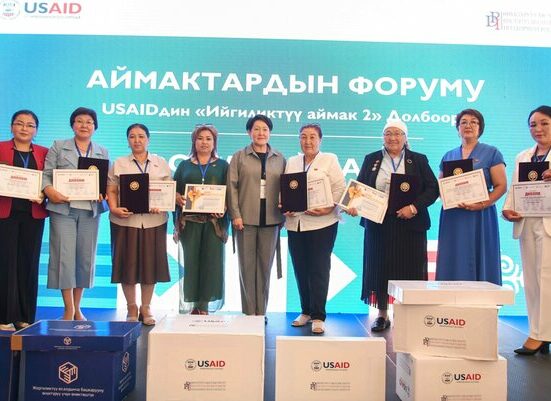The Central Asian Women Leaders’ Caucus Meeting concluded on 23 May in Bishkek. The event, centred on “The role of women in the economies of Central Asia: leadership for promoting digital, social, and environmental innovation,” brought together women leaders from across the region to strategize and commit to enhancing women’s roles in these critical sectors, the United Nations Development Programme (UNDP) in Kyrgyzstan reported.
The Regional Women Leaders’ Caucus was established in December 2020 by UNDP, UN Regional Center for Preventive Diplomacy for Central Asia (UNRCCA), UN Women with the aim to support women in the region in attaining more prominent political, economic, and social roles, thereby enabling them to increasingly influence decision-making processes on issues related to peace, stability, a sustainable development and regional cooperation.
The current event was organized in partnership with the Jogorku Kenesh of the Kyrgyz Republic, Administration of the President of the Kyrgyz Republic, Cabinet of Ministers of the Kyrgyz Republic, with support from UNDP, UNRCCA and UN Women in Kyrgyzstan. Chairs and Deputy Chairs of the Central Asian Parliaments participated in the Caucus Meeting: Ms. Dzhamilia Isaeva, Vice Speaker of the Jogorku Kenesh, Ms. Tanzila Narbaeva, Chair of the Senate of the Oliy Majlis of Uzbekistan, Ms. Daniya Yespayeva, Deputy Chair of the Mazhilis of the Parliament of Kazakhstan, Ms. Bahar Seyidova, Chair of the Committee on Science, Education, Culture and Youth Policy of Turkmenistan, Ms. Firuza Nurullozoda, First Deputy Chair of the Committee on Women and Family Affairs, Tajikistan.
The event marked the official start of Kyrgyzstan’s chairmanship in the Central Asian Women Leaders’ Caucus for 2024. The country has committed to leading efforts to enhance gender equality and support women’s economic empowerment throughout the region.
Dzhamilia Isaeva, Vice Speaker of the Jogorku Kenesh noted that women play a key role in achieving the Sustainable Development Goals (SDGs). “In the era of global digitalization and the fight against climate change, it is necessary to promote the participation of women in the main industries. Women are not only the most vulnerable to climate change, but also important stakeholders in achieving national climate goals. Ensuring gender equality and empowering all women and girls is not only a matter of justice, but also of economic prosperity,” noted Isaeva.
The Caucus was marked by vibrant discussions and strategic planning sessions attended by parliamentarians, government officials, representatives from international and non-governmental organizations, business leaders, and experts from Kazakhstan, Kyrgyzstan, Tajikistan, Turkmenistan, and Uzbekistan.
Alexandra Solovieva, UNDP Resident Representative highlighted in her opening speech: “The Central Asian Women Leaders Caucus has set a new benchmark for regional cooperation in gender equality. By empowering women in digital, social, and environmental sectors, we are unlocking vast potential for sustainable development and economic growth.”
The Chair of the Senate of the Oliy Majlis of the Republic of Uzbekistan, Tanzila Narbaeva, noted in her speech that without increasing the level of education, good results cannot be achieved, therefore, special attention must be paid to women’s education. She emphasized that in Uzbekistan, women have the opportunity to study in master’s programs at the expense of the state, and measures are being taken to increase the economic activity of women. “As a result of systemic measures, the number of women entrepreneurs has doubled, today 40% of entrepreneurs are women,” noted Tanzila Narbaeva, adding that in Uzbekistan, 100 million US dollars have been allocated to support women in business. She also noted that Uzbekistan is implementing reforms in the areas of ensuring gender equality, combating domestic violence, and criminalizing domestic violence, since without solving this problem, it is impossible to talk about women’s opportunities.
The event produced a comprehensive set of policy recommendations. These recommendations will be presented to senior political leaders in Central Asia, advocating for measures to promote regional cooperation and support for women’s initiatives in the digital, creative, and green economies.
Deputy Chair of the Mazhilis of the Parliament of the Republic of Kazakhstan Daniya Yespayeva emphasized that Kazakhstan has taken systematic measures to support women’s economic activity. “Today women are learning new skills as new forms of economic activity emerge. It is worth emphasizing that women do not lag behind the demands of the time in new trends,” stressed Daniya Yespaeva, adding that 19 centers to support women’s entrepreneurship have been opened in Kazakhstan.




